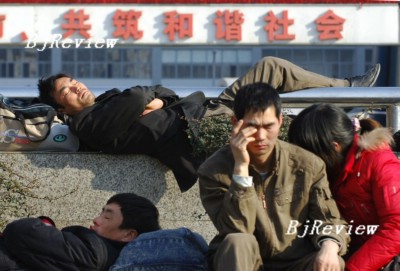
A smile appears on Feng Qunlin's face at the mention of 2008, not just because the Beijing Olympics will take place that year, but also because she will be able to draw her social security money from June.
Feng, a textile worker in Chongqing, will turn 50 in 2008, and according to relative regulations, be eligible to receive some 1,200 yuan as social security per month.
According to Wang Guanghe, a farmer in a Beijing suburb, everyone in his village has medical insurance with each paying 10 yuan per year, which is matched by both the town and county governments.
"With medical insurance we feel much more secure. If there is also endowment insurance, it would be even better," he said.
Over the past decade, an increasing number of ordinary people like Feng and Wang have enjoyed the fruits of the development of China's social security system, which has expanded to cover around hundreds of millions of Chinese citizens.
According to Minister of Labor and Social Security Tian Chengping, by the end of 2005, more than 558 million people, or 43 percent of the country's total population, were covered by basic pension, unemployment, work injury, maternity and basic medical insurance.
In the early 1990s, China defined a socialist market economic system as the goal of national reform, of which a social security system-covering old age pensions and social benefits-is an important part.
During the last ten years or so of reform, China has implemented a basic system that combines personal accountability with state assistance. Through individual payments, enhanced government investment and establishing national social security funds China has basically formed mechanisms with multiple fund channels.
The government continues to pay close attention to the issue of social security, according to Wang Dongjin, former Vice Minister of Labor and Social Security. Social security coverage has gradually expanded from covering only state workers to covering employees across a variety of industries. And in some areas experiments are being conducted to find better ways of providing social security, such as rural endowment insurance as well as new rural cooperative health care and subsistence allowances for rural residents.
Despite the advances that have been made there are still problems with China's social security network. "Great achievements made, still huge problems ahead" is how Liang Ximin, a high-level official in charge of labor and social security affairs in northeast China's Heilongjiang Province, views the situation.
Fairness concern
The task of perfecting China's social security system is made difficult by the fundamental realities of China and because development among different regions and between the urban and rural areas is imbalanced, Wang said.
Statistics show that people aged over 60 account for about 11 percent of the total Chinese population and the aging of the Chinese population will reach its peak by the 2030s. This "silver hair wave" will make the provision of old age pensions a significant problem for China.
According to Wang, the Chinese Government is making continued efforts to perfect an endowment insurance system, reform fundraising modes and establish a multi-level endowment insurance system, in order to create a sustainable system capable of providing for people in their old age.
China's social security input makes up for less than 15 percent of the country's overall fiscal revenue, lower than half the level of most developed countries. This has much to do with the country's basic realities: it has so large a population and its economic development level is relatively low, said Li Yingsheng, a sociologist with the Beijing-based Renmin University of China.
| 